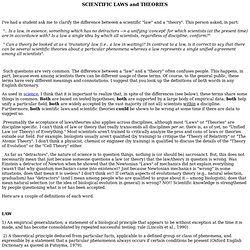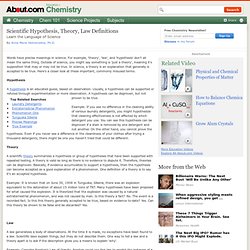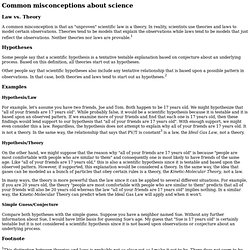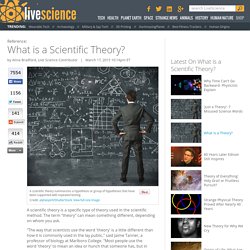

WEBINARS. Scientific Laws and Theories. SCIENTIFIC LAWS and THEORIES I've had a student ask me to clarify the difference between a scientific "law" and a "theory".

This person asked, in part: ".. Is a law, in essence, something which has no detractors --> a unifying 'concept' for which scientists (at the present time) are in accordance with? Is a law a single idea by which all scientists, regardless of discipline, conform? " " Can a theory be looked at as a 'transitory' law (i.e., a law in waiting)? Such questions are very common. As used in science, I think that it is important to realize that, in spite of the differences (see below), these terms share some things in common.
Presumably the acceptance of laws/theories also applies across disciplines, although most "Laws" or "Theories" are discipline specific. As far as "detractors", the nature of science is to question things, nothing is (or should be) sacrosanct. Here are a couple of definitions of each word. 4) 1. Literature Cited Futuyma, D. Krimsley, V. Lincoln, R. Moore, J. Scientific Hypothesis, Theory, Law Definitions. Words have precise meanings in science.

For example, 'theory', 'law', and 'hypothesis' don't all mean the same thing. Outside of science, you might say something is 'just a theory', meaning it's supposition that may or may not be true. In science, a theory is an explanation that generally is accepted to be true. Here's a closer look at these important, commonly misused terms. Hypothesis A hypothesis is an educated guess, based on observation.
Example: If you see no difference in the cleaning ability of various laundry detergents, you might hypothesize that cleaning effectiveness is not affected by which detergent you use. Theory A scientific theory summarizes a hypothesis or group of hypotheses that have been supported with repeated testing. Example: It is known that on June 30, 1908 in Tunguska, Siberia, there was an explosion equivalent to the detonation of about 15 million tons of TNT. Scimisc. Law vs.

Theory A common misconception is that an "unproven" scientific law is a theory. In reality, scientists use theories and laws to model certain observations. Theories tend to be models that explain the observations while laws tend to be models that just reflect the observations. Neither theories nor laws are provable.1 Hypotheses Some people say that a scientific hypothesis is a tentative testable explanation based on conjecture about an underlying process. Other people say that scientific hypotheses also include any tentative relationship that is based upon a possible pattern in observations.
Examples Hypothesis/Law For example, let's assume you have two friends, Joe and Tom. Hypothesis/Theory On the other hand, we might suppose that the reason why "all of your friends are 17 years old" is because "people are most comfortable with people who are similar to them" and consequently one is most likely to have friends of the same age. Simple Guess/Conjecture Footnote. Law Definition - Definition of Law. What is a Scientific Theory? A scientific theory is a specific type of theory used in the scientific method.

The term "theory" can mean something different, depending on whom you ask. "The way that scientists use the word 'theory' is a little different than how it is commonly used in the lay public," said Jaime Tanner, a professor of biology at Marlboro College. "Most people use the word 'theory' to mean an idea or hunch that someone has, but in science the word 'theory' refers to the way that we interpret facts. " The process of becoming a scientific theory Every scientific theory starts as a hypothesis.
Tanner further explained that a scientific theory is the framework for observations and facts. Theory basics The University of California, Berkley defines a theory as "a broad, natural explanation for a wide range of phenomena. Any scientific theory must be based on a careful and rational examination of the facts.
An important part of scientific theory includes statements that have observational consequences.